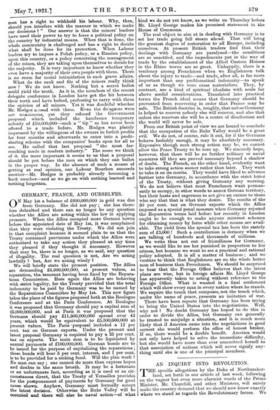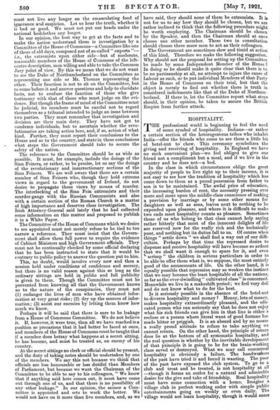AN INQUIRY INTO REVOLUTION. T HE specific allegations by the Duke
of Northumber- land, set forth in our article of last week, following on the vaguer but even more alarmist words of the Prime Minister, Mr. Churchill, and other Ministers, will surely make the country demand that we should now know exactly where we stand as regards the Revolutionary forces. We must not live any longer on the emasculating food of ignorance and suspicion. Let us hear the truth, whether it is bad or good. We must not put our heads under the national bedclothes any longer. must not live any longer on the emasculating food of ignorance and suspicion. Let us hear the truth, whether it is bad or good. We must not put our heads under the national bedclothes any longer. In our opinion, the best way to get at the facts and to make the nation understand them is investigation by a Committee of the House cf Commons—a Committee like one of those of old days, composed not of so-called " experts "- i.e., the extremists upon either side—but of moderate, reasonable members of the House of Commons of the left- centre description, men willing and able to take the Common Jury point of view. By this we mean that we do not want to see the Duke of Northumberland on the Committee as representing one side or Mr. Thomas representing the other. Their function is not to sit on the Committee, but to come before it and answer questions and help to elucidate facts, not to confuse the function of those who give testimony with that of those who must judge on the evi- dence. But though the frame of mind of the Committee must be judicial, its members must be careful not to regard themselves as a tribunal intended to judge an issue between two parties. They must remember that investigation and decision are their main duty. They have not got to condemn individuals, but to ascertain whether the revo- lutionaries are taking action here, and, if so, action of what kind. Further, they must report their conclusions to the House and so to the country, and state in these conclusions • what steps the Government should take to secure the safety of the nation. The reference to the Committee should be as wide as possible. It must, for example, include the doings of the Sinn Feiners, or rather, to be precise, let us say the doings of the revolutionary and insurrectionary sections of the Sinn Feiners. We are well aware that there are a certain number of Sinn Feiners who, though they hold extreme views in regard to the government of Ireland, do not desire to propagate those views by means of murder. The interlocking of the Sinn Fein extremists and their murder-gangs with the Russian Communists and also with a certain section of the Roman Church is a matter of high importance and deserves close investigation. The Irish Attorney-General said lately that he had collected some information on this matter and proposed to publish it in a White Paper. The Committee of the House of Commons which we desire to see appointed must not merely refuse to be tied to too narrow a reference. They must insist that the Govern- ment shall allow them full power to require the evidence of Cabinet Ministers and high Government officials. They must not be continually checked by some official declaring that he has been instructed to state that it would be contrary to public policy to answer the question put to him. This, no doubt, would involve every now and then a session held under conditions of confidence and secrecy, but there is no valid reason against this so long as the ordinary sittings are held in publio and full publicity is given to them. Though the Committee must not be prevented from knowing all that the Government knows as to the nature of the conspiracies, they must not (1) endanger the lives of men who have obtained infor- mation at very great risks; (2) dry up the sources of infor- mation; (3) assist our enemies by letting them know how much we know.
Perhaps it will be said that there is sure to be leakage from a House of Commons Committee. We do not believe it. If, however, it were true, then all we have reached is a position so precarious that it had better be faced at once, and members of the House of Commons must be taught that if a member does betray what happens at a secret sitting, he has become, and must be treated as, an enemy Of his country.
At the secret sittings no clerk or official should be present, and the duty of taking notes should be undertaken by one of the members. We say this not because we think that officials are less honourable or less dutiful than Members of Parliament, but because we want the Chairman of the Committee to be able to say to his colleagues, " We know that if anything said here comes out, it must have come out through one of us and that there is no possibility of any other leakage." In our opinion, the sooner a Com- mittee is appointed and sets to work the better. We would not have on it more than five members, and, as ws have said, they should none of them be extremists. It is not for us to say how they should be chosen, but we are rather inclined to think that the following procedure might be worth employing. The Chairman should be chosen by the Speaker, and then the Chairman should at once choose one other member. These two in consultation should choose three more men to act as their colleagues. The Government are sometimes slow and timid at action of this kind. Therefore we make the following suggestion. Why should not the proposal for setting up the Committee be made by some Independent Member of the House ? In doing so he should make it quite clear that there is to be no partisanship at all, no attempt to injure the cause of Labour as such, or to put individual Members of that Party in the House of Commons on their trial, but that the object is merely to find out whether there is truth in considered indictments like that of the Duke of Northum- berland. If there is, let the Committee report what steps should, in their opinion, be taken to secure the British Empire from further attack.



































 Previous page
Previous page